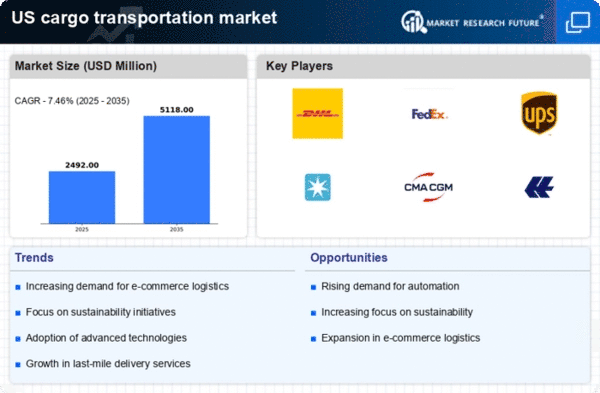E-commerce Growth
The rapid expansion of e-commerce in the US is a pivotal driver for the cargo transportation market. As online shopping continues to gain traction, logistics and delivery services are increasingly in demand. In 2025, e-commerce sales are projected to reach approximately $1 trillion, necessitating efficient cargo transportation solutions to meet consumer expectations for fast delivery. This surge in online retail is compelling companies to enhance their supply chain capabilities, thereby stimulating growth in the cargo transportation market. The need for last-mile delivery services, in particular, is becoming critical, as businesses strive to provide timely and reliable shipping options. Consequently, the cargo transportation market is likely to experience significant growth as it adapts to the evolving landscape of e-commerce and consumer behavior.
Consumer Demand for Speed
Consumer demand for faster delivery options is a significant driver of the cargo transportation market. As customers increasingly expect rapid shipping times, logistics providers are compelled to adapt their services accordingly. In 2025, surveys indicate that over 70% of consumers prioritize delivery speed when making online purchases, prompting companies to enhance their logistics capabilities. This trend is leading to the expansion of same-day and next-day delivery services, which require efficient cargo transportation solutions. Consequently, businesses are investing in advanced logistics technologies and optimizing their supply chains to meet these consumer expectations. The pressure to deliver quickly is likely to continue shaping the cargo transportation market, as companies strive to balance speed with cost-effectiveness.
Environmental Regulations
The cargo transportation market is increasingly influenced by stringent environmental regulations aimed at reducing carbon emissions. In response to growing concerns about climate change, the US government has implemented various policies that require transportation companies to adopt greener practices. For example, regulations may mandate the use of low-emission vehicles or the implementation of fuel efficiency standards. As a result, companies are investing in cleaner technologies and alternative fuels, which could lead to increased operational costs in the short term. However, these regulations also present opportunities for innovation within the cargo transportation market, as businesses seek to comply while maintaining competitiveness. The shift towards sustainability is likely to reshape the market landscape, driving demand for eco-friendly transportation solutions.
Infrastructure Investment
Investment in transportation infrastructure is a crucial factor influencing the cargo transportation market. The US government has allocated substantial funding for the enhancement of roads, bridges, and ports, which is expected to improve the efficiency of cargo movement. In 2025, the federal budget includes over $100 billion earmarked for infrastructure projects, aimed at modernizing the logistics network. Improved infrastructure not only reduces transit times but also lowers operational costs for transportation companies. This investment is likely to facilitate smoother supply chain operations, thereby enhancing the overall competitiveness of the cargo transportation market. As infrastructure continues to develop, it may lead to increased capacity and reliability in cargo transport, further driving market growth.
Technological Advancements
Technological advancements are reshaping the cargo transportation market, introducing innovative solutions that enhance efficiency and reduce costs. The adoption of automation, artificial intelligence, and data analytics is becoming increasingly prevalent among logistics providers. For instance, the use of AI-driven route optimization can lead to a reduction in fuel consumption by up to 15%, significantly impacting operational expenses. Additionally, the integration of Internet of Things (IoT) devices allows for real-time tracking of shipments, improving transparency and customer satisfaction. As these technologies continue to evolve, they are likely to play a vital role in streamlining operations within the cargo transportation market, enabling companies to respond more effectively to market demands and challenges.
















